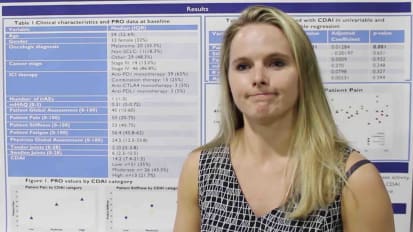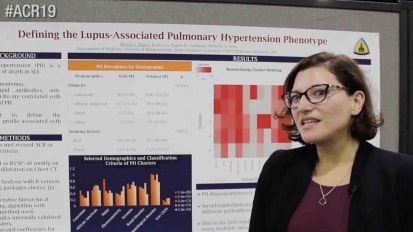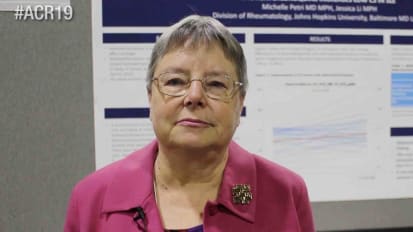The American College of Rheumatology (ACR) and the Association for Rheumatology Professionals (ARP) Annual Meeting
November 8 - 13, 2019
Atlanta, GA
The American College of Rheumatology (ACR)/ Association of Rheumatology Professionals (ARP) annual meeting is the world’s largest rheumatology gathering for physicians, other health care professionals and scientists who treat or research rheumatic and musculoskeletal diseases. Many Johns Hopkins Division of Rheumatology physicians and researchers attended this year’s conference and shared information about recent innovations and discoveries. The following video Q&A’s with Johns Hopkins staff were conducted at the ACR/ARP conference.
Renal Single Cell Genomics Links Type II Interferon and Lupus Nephritis in African-Americans
Andrea Fava says we are currently neglecting the development of specific treatments that could target the particular cells involved in driving lupus in African American patients.Defining the SLE-Associated Pulmonary Arterial Hypertension Phenotype
Marisa Mizus says it’s important to study diverse populations that have lupus. There are few guidelines on how to monitor and treat hypertension in patients with lupus, and Marisa Mizus discusses what her team is doing to help.The Systemic Lupus Erythematosus Cardiovascular Risk Equation
Michelle Petri says current cardiac guidelines lack information on how to best monitor and treat cardiac patients who also have lupus.Low Vitamin D Is Associated with Miscarriage and Preterm Birth in SLE with a U-shaped Relationship
Michelle Petri discusses what she and her colleagues are doing to help women with lupus have a successful pregnancy.Linaclotide for the Treatment of Refractory Constipation in Systemic Sclerosis
Zsuzsanna McMahan discusses a drug rheumatologists can use to treat scleroderma patients who suffer from bowel and colon issues. McMahan also talks about the gastrointestinal complications among patients with scleroderma.Environmental and Atmospheric Factors in Systemic Lupus Erythematosus: A Regression Analysis
George Stojan says his research found that so-called atmospheric factors (wind, barometric pressure, temperature, pollution concentration, etc.) were predictive of specific flares in patients with lupus.Hydroxychloroquine Blood Levels and Risk of Thrombotic Events in Systemic Lupus Erythematous
Researchers found that the lower the levels of hydroxychloroquine, the greater the rate of clotting events. But the researchers were surprised that when they looked at hydroxychloroquine doses prescribed to patients with lupus compared ...





















